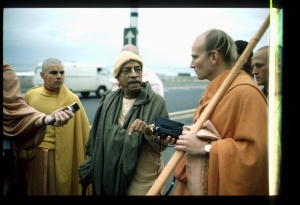SB 10.50.21: Difference between revisions
m (1 revision(s)) |
(Vanibot #0054 edit - transform synonyms into clickable links, which search similar occurrences) |
||
| (One intermediate revision by one other user not shown) | |||
| Line 1: | Line 1: | ||
{{info | {{info | ||
|speaker= | |speaker=Śukadeva Gosvāmī | ||
|listener=King | |listener=King Parīkṣit | ||
}} | }} | ||
[[Category:Srimad-Bhagavatam - Canto 10 Chapter 50]] | |||
[[Category:Bhagavatam Verses Spoken by Sukadeva Gosvami - Vanisource|105021]] | |||
<div style="float:left">'''[[Srimad-Bhagavatam]] - [[SB 10|Tenth Canto]] - [[SB 10.50: Krsna Establishes the City of Dvaraka|Chapter 50: Kṛṣṇa Establishes the City of Dvārakā]]'''</div> | |||
<div style="float:right">[[File:Go-previous.png|link=SB 10.50.20]] '''[[SB 10.50.20]] - [[SB 10.50.22]]''' [[File:Go-next.png|link=SB 10.50.22]]</div> | |||
{{RandomImage}} | |||
{{SBnotice}} | |||
==== TEXT 21 ==== | ==== TEXT 21 ==== | ||
<div | <div class="verse"> | ||
suparṇa-tāla-dhvaja-cihitnau rathāv | :suparṇa-tāla-dhvaja-cihitnau rathāv | ||
alakṣayantyo hari-rāmayor mṛdhe | :alakṣayantyo hari-rāmayor mṛdhe | ||
striyaḥ purāṭṭālaka-harmya-gopuraṁ | :striyaḥ purāṭṭālaka-harmya-gopuraṁ | ||
samāśritāḥ sammumuhuḥ śucārditaḥ | :samāśritāḥ sammumuhuḥ śucārditaḥ | ||
</div> | </div> | ||
| Line 17: | Line 22: | ||
==== SYNONYMS ==== | ==== SYNONYMS ==== | ||
<div | <div class="synonyms"> | ||
''[//vanipedia.org/wiki/Special:VaniSearch?s=suparṇa&tab=syno_o&ds=1 suparṇa]'' — with (the symbol of) Garuḍa (the bird who carries Lord Viṣṇu); ''[//vanipedia.org/wiki/Special:VaniSearch?s=tāla&tab=syno_o&ds=1 tāla]'' — and the palm tree; ''[//vanipedia.org/wiki/Special:VaniSearch?s=dhvaja&tab=syno_o&ds=1 dhvaja]'' — by the banners; ''[//vanipedia.org/wiki/Special:VaniSearch?s=cihnitau&tab=syno_o&ds=1 cihnitau]'' — marked; ''[//vanipedia.org/wiki/Special:VaniSearch?s=rathau&tab=syno_o&ds=1 rathau]'' — the two chariots; ''[//vanipedia.org/wiki/Special:VaniSearch?s=alakṣayantyaḥ&tab=syno_o&ds=1 alakṣayantyaḥ]'' — not identifying; ''[//vanipedia.org/wiki/Special:VaniSearch?s=hari&tab=syno_o&ds=1 hari]-[//vanipedia.org/wiki/Special:VaniSearch?s=rāmayoḥ&tab=syno_o&ds=1 rāmayoḥ]'' — of Kṛṣṇa and Balarāma; ''[//vanipedia.org/wiki/Special:VaniSearch?s=mṛdhe&tab=syno_o&ds=1 mṛdhe]'' — in the battle; ''[//vanipedia.org/wiki/Special:VaniSearch?s=striyaḥ&tab=syno_o&ds=1 striyaḥ]'' — women; ''[//vanipedia.org/wiki/Special:VaniSearch?s=pura&tab=syno_o&ds=1 pura]'' — of the city; ''[//vanipedia.org/wiki/Special:VaniSearch?s=aṭṭālaka&tab=syno_o&ds=1 aṭṭālaka]'' — in the watchtowers; ''[//vanipedia.org/wiki/Special:VaniSearch?s=harmya&tab=syno_o&ds=1 harmya]'' — palaces; ''[//vanipedia.org/wiki/Special:VaniSearch?s=gopuram&tab=syno_o&ds=1 gopuram]'' — and in the gateways; ''[//vanipedia.org/wiki/Special:VaniSearch?s=samāśritāḥ&tab=syno_o&ds=1 samāśritāḥ]'' — having taken positions; ''[//vanipedia.org/wiki/Special:VaniSearch?s=sammumuhuḥ&tab=syno_o&ds=1 sammumuhuḥ]'' — fainted; ''[//vanipedia.org/wiki/Special:VaniSearch?s=śucā&tab=syno_o&ds=1 śucā]'' — by grief; ''[//vanipedia.org/wiki/Special:VaniSearch?s=arditāḥ&tab=syno_o&ds=1 arditāḥ]'' — tormented. | |||
</div> | </div> | ||
{{SBcollapse}} | |||
==== TRANSLATION ==== | ==== TRANSLATION ==== | ||
<div | <div class="translation"> | ||
The women stood in the watchtowers, palaces and high gates of the city. When they could no longer see Kṛṣṇa's and Balarāma's chariots, identified by banners marked with the emblems of Garuḍa and a palm tree, they were struck with grief and fainted. | The women stood in the watchtowers, palaces and high gates of the city. When they could no longer see Kṛṣṇa's and Balarāma's chariots, identified by banners marked with the emblems of Garuḍa and a palm tree, they were struck with grief and fainted. | ||
</div> | </div> | ||
| Line 31: | Line 36: | ||
==== PURPORT ==== | ==== PURPORT ==== | ||
<div | <div class="purport"> | ||
The women are especially mentioned here because of their extraordinary attachment to Lord Kṛṣṇa and Lord Balarāma. | The women are especially mentioned here because of their extraordinary attachment to Lord Kṛṣṇa and Lord Balarāma. | ||
</div> | </div> | ||
__NOTOC__ | </div> | ||
</div> | |||
<div style="float:right">[[File:Go-previous.png|link=SB 10.50.20]] '''[[SB 10.50.20]] - [[SB 10.50.22]]''' [[File:Go-next.png|link=SB 10.50.22]]</div> | |||
__NOTOC__ | |||
__NOEDITSECTION__ | |||
Latest revision as of 19:20, 17 February 2024

A.C. Bhaktivedanta Swami Prabhupada
Please note: The synonyms, translation and purport of this verse were composed by disciples of Śrīla Prabhupāda
TEXT 21
- suparṇa-tāla-dhvaja-cihitnau rathāv
- alakṣayantyo hari-rāmayor mṛdhe
- striyaḥ purāṭṭālaka-harmya-gopuraṁ
- samāśritāḥ sammumuhuḥ śucārditaḥ
SYNONYMS
suparṇa — with (the symbol of) Garuḍa (the bird who carries Lord Viṣṇu); tāla — and the palm tree; dhvaja — by the banners; cihnitau — marked; rathau — the two chariots; alakṣayantyaḥ — not identifying; hari-rāmayoḥ — of Kṛṣṇa and Balarāma; mṛdhe — in the battle; striyaḥ — women; pura — of the city; aṭṭālaka — in the watchtowers; harmya — palaces; gopuram — and in the gateways; samāśritāḥ — having taken positions; sammumuhuḥ — fainted; śucā — by grief; arditāḥ — tormented.
Translation and purport composed by disciples of Śrīla Prabhupāda
TRANSLATION
The women stood in the watchtowers, palaces and high gates of the city. When they could no longer see Kṛṣṇa's and Balarāma's chariots, identified by banners marked with the emblems of Garuḍa and a palm tree, they were struck with grief and fainted.
PURPORT
The women are especially mentioned here because of their extraordinary attachment to Lord Kṛṣṇa and Lord Balarāma.